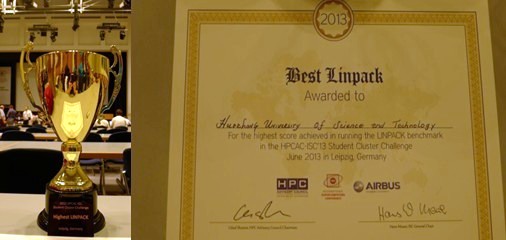BEIJING, /PRNewswire/ — On June 19 (German time), the 2013 International Student Cluster Challenge (ISC’13) was closed in Leipzig, Germany. The team from Huazhong University of Science and Technology (HUST) in China has won the Best Linpack award and set a world new record with 8.455TFLOPS. The team from the Centre for High Performance Computing of South Africa won the Overall Best award, and the team from Tsinghua University ranked second in terms of overall score at ISC’13. It is China’s second championship at ISC’13 after Tianhe-2 claimed the lead in the Top500 list. The world is marveling at China’s rapid development in system research, application development, and talent education in the field of supercomputers.

|
|
Jointly organized by the organizing committee of International Supercomputing Conference and the Advisory Council of High Performance Computing (HPC AC), ISC is known as one of the top three world supercomputer competitions alongside the SC from the U.S. and the Asia Student Supercomputer Challenge from China. ISC grants two awards, namely, Overall Winner and Highest Linpack winner.
Each team is required to structure on its own the supercomputer system with a total power budget of 3kW, on which two performance benchmark tests, namely, HPCC and HPL, as well as five application performance tests, namely, GROMACS, MILC, WRF, AMG and CP2K, should be conducted. It is an all-round assessment for supercomputer skills, experience and knowledge of the teams in the competition. |
“As the performance of supercomputers are estimated to grow by a factor of 10 every 3 years, supercomputer talents are urgently needed to promote the popularization of supercomputers. The training for the next generation of supercomputer scientists outweighs the manufacturing of supercomputers,” said Mr. Gilad Shainer, chairman of the ISC. “Our team members came closer to and learned more about supercomputers through the competition. It is beyond their reach in the classroom. Just like the words on their T-shirts, they are the next generation of high-performance computing experts,” said Shi Xuanhua, the mentor of the HUST team.
Eight teams competed with each other vigorously over the 4-day competition from June 16 to 19. They included teams from University of Colorado and Purdue University of the U.S., University of Edinburgh of the U.K., Chemnitz University of Technology of Germany, Costa Rica Institute of Technology, Centre for High Performance Computing of South Africa, and the two representative teams from China.
|
|
The teams from HUST and Tsinghua University won high recognition from participants and other teams for their strong overall strength. The mentor from Chemnitz University of Technology of Germany said, “The Chinese teams are impressive. Besides their commitment, they have extensive supercomputer application experience with a very broad view on problem solving.” The mentor from Costa Rica Institute of Technology even said that the Chinese teams are their role models, and that he had felt great pressure from the Chinese teams’ extensive experience in power control and performance optimization. |
Chinese teams won the two major awards, namely, Overall Winner and Highest Linpack at ISC’12. An expert pointed out that the Chinese teams’ excellent performance in the two competitions and Tianhe-2’s ranking as No. 1 in the latest Top500 list released at ISC’13 demonstrate that China has made great progress in talent training, as well as basic technological research and application of supercomputers, forming a healthy industrial system.
The teams from HUST and Tsinghua University structured their high performance clusters in this competition with Inspur NF5280M3 supercomputer nodes. With stable and excellent performance in the entire competition process, such supercomputer servers helped the Chinese university teams to win the overall championship and best performance awards at ISC’12, SC’12 and ASC’13. It is said that Inspur is also an organizer of ASC which is participated in by 43 higher education institutions from a dozen of countries and regions in Asia, and outweighs ISC’13 in scale. Liu Jun, high performance computing director of Inspur Group, said in an interview, “We hope that student’s passion for supercomputer will be motivated through competition which can be enjoyed by all, and winning is by no means the only a task. An intense passion for supercomputers can only be generated in this way. Inspur hopes to motivate and educate supercomputer talents, promote communication and improve applications, and aims to fundamentally advance the development of the supercomputer industry nationally and internationally.
More information can be found at hpc.inspur.com/news/23593.shtml
SOURCE Inspur Group
CONTACT: He Jie, +86-10-8258-1044, [email protected]
Web site: hpc.inspur.com/news/23593.shtml
Web site: www.hpcadvisorycouncil.com/events/2013/ISC13-Student-Cluster-Competition/team_purdue.php